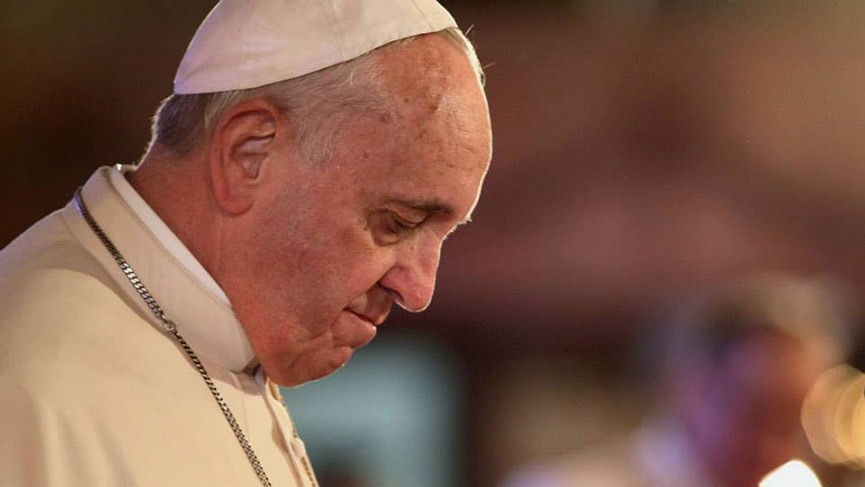Open Letter: Pope Francis' Journey to Iraq

Pope Francis
It’s on the minds of many. Why is Pope Francis going to Iraq, March 5 to 8, in these tough times of pandemic, political instability and rumours of threats to his life?
By Carl Hétu, director of Catholic Near East Welfare Association - Canada
One reason stands out: to show solidarity with the Christians of that country. Seemingly not worthy enough to make it on the evening news, Christians in Iraq have found themselves unprotected and mistreated – threats, kidnappings, torture, assassinations – over the past 17 years. It’s no exaggeration to say most have been forced to flee. The numbers speak for themselves – 1.5 million Christians in Iraq in 2003 and today, barely 180,000 remain. The rise of ISIS in the summer of 2014 was the last blow that forced more than 100,000 of them to flee to save their lives, leaving Mosul and the Nineveh Plains to find refuge in northern Iraqi Kurdistan. It’s no wonder that the pope will stop at these three locations. Local Christians have lived a real nightmare and many bishops, nuns, priests and ordinary faithful have been martyred – because of their faith.
Known for bridge building, Pope Francis will be meeting with a wide swath of Christian groups in the country, including, Syriac Catholics and Orthodox Christians, Chaldean Catholics and Assyrians of the East and Armenian Christians (both from the Catholic and Apostolic Churches). Here again, the pope knows that their survival depends on this important unity among Christians.
Unity among the world’s Christians has been at the heart of Pope Francis’ papacy, as he made clear in his first trip to Israel and Palestine. There, he not only prayed with but began a long-lasting working relationship with the Ecumenical Patriarch of the Constantinople, Bartholomew I, after 1000 years of broken relations.
However, the pope also knows this isn’t enough. Christians in the Middle East have had to learn to work with a Muslim majority for at least the last 1400 years. If they are still in the region today, and largely wanted, it is because they were able to take their place and develop strong ties with Muslim leaders despite some dark moments in history. Today, Christians do face one of their darkest moments as the numbers reveal – a total of more than 2.5 million forced to leave not only their country but all the Middle East in only 17 years – many leaving from Iraq and Syria. This is the worst decline of Christians since the Armenian genocide of 1915. Developing strong relations with Muslim leaders is then, clearly, a key priority of any papal visit. Thus, as the pope has done on trips to Palestine, Egypt, Turkey and the United Arab Emirates, he will meet with leaders such as Grand Ayatollah Sistani in Najaf, the leading spiritual leader of Iraqi Shia Muslims.
Still, many experts believe it is too late for Iraqi Christians. It is true that Iraq’s Christians were once recognized for nurturing excellent relations with other ethnic and religious groups within their country. Entrepreneurially driven, they have been important contributors to the country's socio-economic development, creating jobs and establishing effective social services and health care institutions that provide assistance to the most disadvantaged, regardless of religion.
Regardless of whether they are right or wrong, if we look south-west of Baghdad near the Mediterranean Sea, we can see what contributions even a small number of Christians can still offer to a fledgling society. Despite 73 years of conflicts and war between Palestine and Israel, and now, an illegal occupation of Palestine by Israel, Christians play an undeniably important social role. Even with only 1% (51,000) of the population in the Palestinian Territories, Christians account for 45% of all local social services. But the Christians too are in a rough spot and many wonder how long it will take to have most of them gone from their home and the Holy Land.
For Catholic Near East Welfare Association, an agency of the Holy Father that has worked tirelessly in the region since 1926, endless conflicts are destroying our chances for a new tomorrow. For Christians who remain, the pope’s visit is a concrete reminder that they aren’t alone and it is a boost for them to continue their mission of offering a variety of services to youth, seniors, victims of violence and others in need – regardless of creed. These are the programs we will continue to support.
By his actions and words, Pope Francis is demonstrating that religion can lead the way to peace through dialogue and reconciliation. He’s also reminding onlookers as well as power brokers in the region that peace – locally, regionally and worldwide – can only be achieved if all people of different ethnicities, religions and nationalities develop friendships and trust by taking the time to meet and look past their differences together, recognizing their common goals and humanity.

Comment
Comment
Add new comment